Celeste Orlosky is a worker leader at Bookshop Santa Cruz. She and her co-workers recently formed a union amidst changes in her workplace due to COVID-19. Watch her interview or read the abridged transcript below.
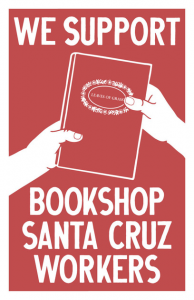
Tim Newman: We’re here to learn more about how the Bookshop Santa Cruz workers came together, started organizing, successfully formed a union at their shop, and what thoughts you might have for other workers who are interested in organizing to improve conditions in their workplace.
I’m Tim. I’m the campaign’s director at coworker.org, and part of what we do is run an online platform where anyone can start a campaign about a workplace issue. And in this case, Eric, who you will soon meet, started a petition to support Celeste and her co-workers who were organizing the Bookshop Santa Cruz. That’s where we enter the picture, and I’ll pass it off to Eric and then Celeste.
Eric Dirnbach: Hi, I’m Eric Dirnbach based in New York City, and I’m a volunteer with the Emergency Workplace Organizing Committee, or EWOC. It was started at the beginning of the pandemic to find ways to help workers that wanted to improve conditions at work. Whether it was working conditions related to the pandemic or other things, and it was through that project that I eventually met Celeste who was organizing at her workplace.
Celeste Orlosky: Hi, I’m Celeste. I’ve worked at Bookshop Santa Cruz for almost a year and a half, and we began organizing last May when restrictions on retail were lifted, and from there, got in touch with DSA, got in touch with EWOC, and then just successfully voted in our unionization with CWA Local 9423 on February 3rd.
How to Start a Union
ED: Great! So Celeste, why don’t you walk us through the timeline a little bit.
CO: Sure! So in March of 2020, retail in California shut down. We were doing really limited service, it was just curbside and online orders. And then in May the shelter-in-place order was lifted for retail so the store was able to re-open at limited capacity.
We received a correspondence from management that we could come back to work, and if we chose not to it would be a voluntary resignation and then legally we no longer would be eligible for unemployment benefits. We were given four days to decide that, and many people felt that was not enough time to make such a large decision. We also didn’t receive any correspondence about what sort of measurable protections we would be receiving. So we had questions like, “Is there going to be a greeter? How are we going to deal with people who are fighting back against wearing masks? Will PPE be provided for us?” That was our first collective action.
We drafted an email with a handful of those points that we were concerned about and we got a response! We got answers to all of those questions, and we kind of just kept the ball rolling from there. I realized that organizing is not much more than just talking to your co-workers: finding out what’s going on with each other, and we found that we had a lot of concerns in common. And for us in our workplace, it seemed like there was not any other way forward than forming a union. We wouldn’t have legal protections any other way. And most of us don’t have experience with unions. Maybe only a handful of us have had union jobs.
“It’s the best time for us to have a union!”
Celeste Orlosky
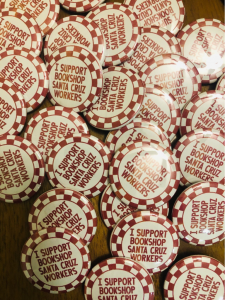
ED: I think most workers don’t realize that any time any group of workers does anything together in the workplace to improve conditions, you are already acting like a union. But you wanted to move forward with a more official process, and one of those ways was to hold the union election. And we were trying to find a union for you all to work with and we eventually connected with Communication Workers of America, CWA, right?
CO: The great thing about CWA is that one of their biggest contracts is AT&T, so they’re everywhere. They’re excited about getting these smaller shops protected and making them part of the union family. It just seemed like a really natural fit. Once we started talking, it just made sense.
Forming a Union Organizing Committee
ED: At that point, you had four or five folks on your organizing committee, and we recommend at EWOC that folks do one-on-one conversations and talk with each other to find out issues and then form an organizing committee, which are going to be the core activists on a campaign. So what did October and November look like as you had to get authorization cards signed and then you filed in December?
CO: So we got this great document from EWOC that was an Excel sheet, and it’s just mapping your workplace, so we had a list of the folks to make sure our numbers were right. CWA requires you to have 70% support before you go forward with anything public, assuming that a few people will drop off. Once we had that 70%, we were mailed the union cards. We got those signed and then on December 11th, we went ahead and presented our 13-point mission statement to the owner of Bookshop.
We did ask for voluntary recognition. That didn’t happen, and it generally doesn’t to my understanding. So we filed for an election the next Monday to protect ourselves legally from any major union busting or retaliation. That was a tense couple days for sure. But ultimately we had strength in our numbers, and I never for a minute thought that we wouldn’t win our election. Ultimately, we had 31 people in the bargaining unit. 28 people sent in their ballots, and we won our vote 18 to 10. So that’s a 30% difference there.
ED: Folks may be surprised to hear that you only need 30% of workers to sign cards to file for an election, but it would be basically union malpractice to file with that few. The reason we do that [file with more that 30%] is that we expect there’s going to be union-busting activities, and that some of that support is going to get whittled away over time, and that in the final result, if you end up with slightly less than 50%, you’ve just lost. So I’m really glad that you started with 70%, but talk to us about that meeting.
Writing a Mission Statement
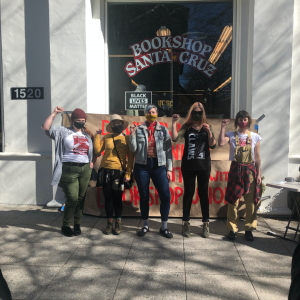
CO: We didn’t want to ambush anybody, so we did make an appointment. We said, “We would like to chat with you about workplace conditions.” And we have this mission statement that was gleaned from our conversations with our co-workers, so we have 13 points on there.
I’ll just highlight some of them right now.
- Just cause for termination
- No more at-will employment
- Dedicated, uninterrupted paid time for section work and professional development, especially with the holidays that we were going through
- Paid time off for part-time and full-time employees
- Improved scheduling procedures
- Big one: limiting the reliance on the Santa Cruz Police Department. That’s something a lot of us feel really strongly about. George Floyd was murdered over the police being called for an allegedly counterfeit $20 bill. That was in a retail space.
- De-escalation training for all staff
- Tangible anti-racist procedures and actions
I just read the mission statement basically. And we felt like: You’re either down or you’re not. We did ask for an answer by the end of business that day just so we could decide whether to file or not because if we didn’t get a response then we were gonna file to protect ourselves.
I think people misunderstand what a union is as well. This is what I keep coming up against especially in my conversations with reporters. They’ll ask, “Well what if Bookshop closes?” Why do people think we want to close Bookshop? That’s where I work. That’s my income. That’s my livelihood. We just want these concerns to be met, and we want to reach an agreement on them.
Building Public Support for the Union
ED: So at first everything was very quiet. It was all down low. You were hoping that nobody ran to the boss to tell them it was happening. Then around this time when you notified the boss that this was happening, you went public. There’s several aspects to that I’m gonna ask you about.
One is we launched a coworker.org petition, and at this point we have over 2,000 signatures. It’s still up, and we’ll keep it up there as long as you’re negotiating a contract.
Then I wanted to ask you about your local support. You had a rally, I think you’ve had a few rallies since then, and I know DSA Santa Cruz supported you, and I think you had a lot of support from town because this was a really high-profile campaign, right?
CO: For a workplace of like 40 to 50 people, 2,000 signatures feels incredible. I think the big thing for us with the petition is people don’t know that this is going on, so it’s a great way to get the word out, and it also gives people an actionable item. People are always like, “How can I help? What can I do to support?” I’m like, “Go sign the petition, share it on Facebook.” That’s been really really helpful for us in our campaign. In terms of the public-facing stuff that we’ve been doing, DSA has been super instrumental. They’re a total powerhouse in getting people out.
I really enjoyed the rallies. It can feel really insular sometimes like we’re just talking amongst ourselves and our co-workers, but to really see that support whether it’s on Twitter, Facebook, or in person it really lifts our spirits and reinvigorates us to do what we’re doing and keep going.
Election Period
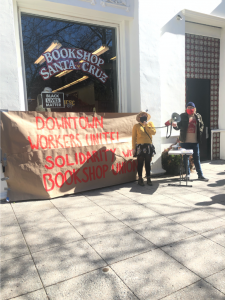
ED: So that was mid-December, and then your election mail ballot period started at the beginning January and went for three weeks to the end of January. So at this point, what we fear and worry about is that there’s going to be union-busting activities happening. So I want to ask you, what kinds of things happened, and how did you deal with it?
CO: We really only had one one meeting that was required for us to attend. They closed the store early, which I’ve never had happen for a staff meeting. There’s always going to be those handful of people who are just not stoked: they’re anti-union. I want to highlight: we’ve never done this before.
Looking back, there’s certain ways that we would have done things differently, but we ran the best campaign that we knew how to do. I’ve learned so much, and I’m so excited. I’m hyped up on organizing and I’m stoked to share my experience and knowledge with other folks.
ED: You had a solid majority of folks that you held the entire time. If all your supporters mailed in their ballots, you were going to win, which is what happened. But I think what you said is there are some folks that are hard to move along. I know it was tough. I don’t know if you have any insights about how to move people.
CO: Some folks are never going to be down, and that’s for multiple reasons. I think for us, our solidarity was more important, and I’ve struggled with this a lot, feeling kind of bad about hurting people’s feelings with the union. But then I’m like, the workplace made a decision to run their business this way. Especially during the pandemic, people are like, “Oh, it’s a bad time to have a union.” It’s the best time for us to have a union! We need protections more than ever. If you think it’s a bad time now, it’s never going to be a good time, and I’m not going to change your mind, and I’m just going to stay with my truth, what I know, which is that we deserve protections. We deserve to speak up. People got their heads knocked in for our right to organize, and it’s our legal right, and I’m going to do it.
Misunderstandings About Unions
ED: I think sometimes people have their own view about what a union is, and it’s a negative one.
CO: There’s this fundamental misunderstanding of what a union is. There are comments on Facebook like, “Oh those people striking in front of the store are going to be so pissed a year from now when the store is gone.” There’s no strike, you guys. They just don’t know that a union does not equal strike. Europe has way more union strength than we do, and we need to build that back up because the more information there is about it, the more people realize, “Hey, actually I do have power as a worker and my labor has value and I can ask to be protected while I’m doing this labor.”
TN: I’m curious, what are some of the most important things that you would advise to workers in other workplaces who are thinking about this and particularly in the bookshop industry?
CO: We are seeing a lot of organizing in the publishing and bookshop world. It’s super cool to see a lot of us have the same concerns, but I just want to highlight again: Organizing is just talking to your co-workers. So you just get to know each other really well, and it’s good to also to find people who play off of your weaknesses. I’m really good at talking to people. What I’m not good at is setting up meetings, scheduling, Zoom calls, and stuff. So we have someone who’s really good at that sort of stuff and the theory of it. That’s the other thing that’s an advantage to the bookstore. A lot of people are really good writers, so we got a lot of great content. We made a little zine as well that has poetry from one of our alumni. Whatever the skill that you have, utilize it. You have a person who’s a printmaker? Have them make prints. You have a person whose aunt has a food truck who wants to donate her food? Bring it to the rally. It’s a lot of work. I’m not going to lie. I work at Bookshop, I also go to school, and my boyfriend can tell you he was like, “I feel like all you do is Zoom calls.” And you know what? It’s fine because that’s what I want to be doing. I want to be here having the Zoom calls with you folks, but it’s like another job.
Next Steps
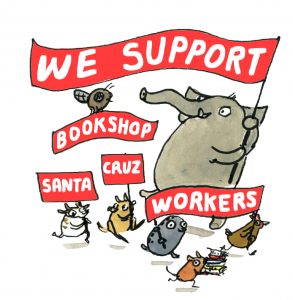
ED: So what’s next in the process?
CO: We’re going to be sending out a survey to everyone in the bargaining unit probably based on those 13 points on our mission statement. I’ve heard from some people they’re like, “You know, I studied the mission statement, but now that I thought about it, this one thing doesn’t seem as important as this other thing.” So we’re going to be finding out from folks: What is the issue that you’re most concerned about? How do you think that we can solve this issue? What’s the best thing for us?
You know some of these things during a pandemic might not be financially sustainable for the store. That’s fine, we’ll make provisions in our contract. It’s going to be totally negotiable. We’re going to create something that’s going to work for us during this time where profits are super down, and it’s really hard to survive. We wouldn’t unionize if we didn’t want the store to stay open and continue to have it be a great place for people to work who come in the future. I think that there’s a lot of things that we can agree on, and I think that Bookshop has some policies already in place that we can build off of so we’re definitely not starting from scratch.
Another big one for us too is at Bookshop, most people work one or two different positions, and there’s historically been an issue with people being underpaid for certain positions. So I think we can streamline. I think it’s one of those things where it’s just the way it’s always been done but it’s like: It’s 2021, baby. It’s a pandemic. Let’s streamline some stuff. Let’s make your job easier. Let’s make payroll easier for you. It doesn’t have to be so tricky. Let’s work together, let’s figure something out. I’m really excited.
You know I’ve never done anything like this before, I’ve never followed through on anything like this before. I’m a great procrastinator, so this has been a really cool experience for me to show up for myself and my co-workers.
TN: Celeste, if people want to get in touch, and they want to follow the work that you’re doing with your coworkers, how can they find you?
CO: So we’re at Instagram and Twitter. You can also shoot us an email if you’re trying to organize your workplace, especially if you’re in the California area. We’re already talking with a few workplaces, not necessarily about unionizing, but just what we did, how it works, and just sharing our experience. The Zoom calls are not ending anytime soon.
ED: And I think you could sign the co-worker petition. We’re keeping it up there. It’s up there until you’re done with the contract. So absolutely keep folks signing up for that.



